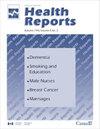青少年社交媒体的使用及其与关系和联系的关联:加拿大学龄儿童的健康行为,2017/2018。
IF 3.3
2区 医学
Q2 PUBLIC, ENVIRONMENTAL & OCCUPATIONAL HEALTH
引用次数: 0
摘要
背景:健康的人际关系和联系的发展对青少年的健康至关重要。社交媒体的使用在加拿大年轻人的生活中起着至关重要的作用,然而,不同类型的社交媒体使用与关系和联系质量之间的关联仍然未知,大多数关于这一主题的现有分析都是基于适度和非代表性的样本。数据和方法:使用全国代表性学龄儿童健康行为研究的2017/2018年报告(n=17,149;在11岁至15岁的青少年中,研究了密集(频繁使用社交媒体与他人联系)和问题(使用社交媒体会上瘾)社交媒体使用与青少年关系和联系的可用测量方法之间的联系的强度、一致性和重要性。结果:总体而言,密集使用(几乎所有时间与他人在线交流)和有问题的使用(潜在的社交媒体成瘾)在女孩中比男孩更常见(分别为38%的女孩对30%的男孩和7.7%的女孩对5.2%的男孩),患病率随着年龄的增长而上升。密集使用与更积极的朋友社会关系相关,尤其是在女孩中(相对风险[RR] = 1.40[95%置信区间(CI) 1.28 - 1.54]),而在研究的所有群体中,有问题的使用与牢固的人际关系和联系始终呈负相关。值得注意的是,男孩(RR= 0.58 [95% CI 0.42至0.79])和女孩(RR=0.48 [95% CI 0.36至0.63])的不良使用与牢固的家庭关系呈负相关。解释:大量使用社交媒体有可能加强青少年之间的关系和联系。然而,当社交媒体的使用变得上瘾或“有问题”时,它与较弱的人际关系和社会脱节感高度相关。与社交媒体使用有关的公共卫生倡议应考虑不同类型的社交媒体使用如何对健康的不同方面产生潜在影响。本文章由计算机程序翻译,如有差异,请以英文原文为准。
Adolescent social media use and its association with relationships and connections: Canadian Health Behaviour in School-aged Children, 2017/2018.
Background
The development of healthy relationships and connections is of fundamental importance to adolescent well-being. The use of social media plays a vital role in the lives of young Canadians, yet the association between different types of social media use and the quality of relationships and connections remains unknown, and most existing analyses on this topic are based on modest and non-representative samples.
Data and methods
Using 2017/2018 reports from the nationally representative Health Behaviour in School-aged Children study (n=17,149; ages 11 to 15 years), the strength, consistency and significance of associations was examined between intensive (frequent use to connect with other people) and problematic (use that depicts addictive qualities) social media use and available measures of adolescent relationships and connections.
Results
Overall, intensive use (online communication with others almost all of the time) and problematic use (potential addiction to social media) were more common in girls than boys (38% of girls versus 30% of boys and 7.7% of girls versus 5.2% of boys, respectively), with prevalence levels that rose with age. Intensive use was associated with more positive social relationships with friends, especially among girls (relative risk [RR] = 1.40 [95% confidence interval (CI) 1.28 - 1.54]), while problematic use was consistently and negatively associated with strong relationships and connections in all groups in the study. Notably, problematic use was negatively associated with strong family relationships in boys (RR = 0.58 [95% CI 0.42 to 0.79]) and girls (RR=0.48 [95% CI 0.36 to 0.63]).
Interpretation
Intensive use of social media has the potential to strengthen relationships and connections in adolescents. However, when social media use becomes addictive or "problematic", it is highly correlated with weaker relationships and a sense of social disconnection. Public health initiatives related to social media use should consider how different types of social media use have the potential to impact on different aspects of health.
求助全文
通过发布文献求助,成功后即可免费获取论文全文。
去求助
来源期刊

Health Reports
PUBLIC, ENVIRONMENTAL & OCCUPATIONAL HEALTH-
CiteScore
7.30
自引率
4.00%
发文量
28
期刊介绍:
Health Reports publishes original research on diverse topics related to understanding and improving the health of populations and the delivery of health care. We publish studies based on analyses of Canadian national/provincial representative surveys or Canadian national/provincial administrative databases, as well as results of international comparative health research. Health Reports encourages the sharing of methodological information among those engaged in the analysis of health surveys or administrative databases. Use of the most current data available is advised for all submissions.
 求助内容:
求助内容: 应助结果提醒方式:
应助结果提醒方式:


